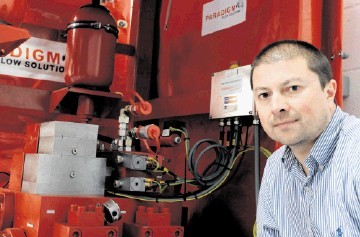
IT’S a well-known fact; leave it out in all weathers and steel will rust. So, the longer a piece of pipe is left out in the wind and rain, the rustier it will get and if it is near the sea, corrosion tends to be faster.
The problem is exacerbated offshore because of the salt-laden marine environment.
It is claimed that corroded pipes are in use today, as fire water deluge systems providing critical safety protection for offshore oil installations.
“These pipes have been in use with salt water running through the system internally and being exposed to the elements externally, in some cases for 25 years or more,” Rob Bain of Paradigm Flow Solutions told Energy.
“Whilst the HSE (Health & Safety Executive) took a major step a year ago to improve safety in ageing assets by introducing the KP4 programme, it is now for operators to take the action needed to keep people safe for the next 25 years of an asset’s life.”
KP4 provides guidelines for inspection and maintenance of ageing installations, outlining key areas of concern including deluge systems.
“Offshore these intricate topsides systems operate in much the same way as a sprinkler, quenching flames,” said Paradigm’s MD.
“The main difference is that the conditions offshore are very different to a system found in a shopping centre or office. The deluge system is usually not coated and can go unnoticed, being fixed at a high level. This coupled with the aggressive environment results in the optimum situation for corrosion to occur.”
Mr Bain warned: “All oil and gas producing installations are high-risk due to flammable and hazardous materials. When things do unfortunately go wrong, the deluge system is one of the major factors in safeguarding people by containing any fires. Relying on a rusty piece of pipe is not a solution.”
A poorly maintained deluge system that contains an abundance of rust, scale and marine growth deposits will, if used, cause that material to wash along the pipe to the deluge outlet nozzle and block it.
“But this is not a ‘high-tech’ problem,” said Mr Bain, adding that the external condition of pipework can often indicate its internal state.
“If a deluge system is needed, it is for a very good reason. Each and every person’s life on that platform depends upon that deluge system working properly.”
He said too that deluge systems have been found to be modified over the years without the documentation being updated, which is why it is imperative to ensure system drawings and design philosophy are accurate.
Even simpler, the operator can visually inspect the deluge system. External condition is often a good indicator of internal condition.
Operators have tried to sort the problem with chemical treatment and high pressure water jetting, but these methods can have limited effectiveness and even damage the fabric of the pipework.
Mr Bain pointed out that simple cleaning techniques such as rotary power brushing can remove tuberculations along with rust, scale and marine materials from the pipe, without causing any degradation to the pipe.
Jake Molloy, regional organiser of the RMT Offshore Energy Branch, affirmed that keeping firewater systems in good shape “remains a serious issue”.
He told Energy that defective systems presented “hidden or unknown danger”.
“Offshore workers are reliant on these systems working for their protection offshore. It follows there has to be a regular maintenance programme of inspection/testing to ensure the reliability of these systems.
“But no operator wants unscheduled shut downs, so all too often the inspection and testing is deferred and delayed until annual shut down periods or in some cases, it’s not done at all.
“This means there could be the hidden danger of ‘unavailability’ of deluge; in short the system fails to work due to corrosion, blockages or any number of other problems like pipes bursting as they pressurise.
Any fire occurring where there is no deluge then has the potential to escalate very rapidly, while at the same time the duty holder is forced to put people in to fight it, exposing those people to even greater risks.”
Mr Molloy said that Paradigm, which has come up with an innovative approach to maintaining deluge/firewater systems, was not short-listed at Oil & Gas UK’s safety awards launched early this year.
Oil & Gas UK’s health and safety manager, Bob Lauder, responded by saying that there is recognition that in the past there have been problems relating to corrosion and degradation of components in fire deluge systems on some older installations, but that this was why major refurbishment programmes have been carried out.
Mr Lauder said: “Earlier in the year, Oil & Gas UK established the Asset Ageing and Life Extension workgroup to share best practice among dutyholders on how to manage ageing assets and life extension of older installations and to help them prepare for the HSE’s KP4 inspections.
“Oil & Gas UK has been compiling this best practice and intends to publish this in the form of a guidance document. This will help dutyholders to develop and implement management systems that address ageing and life extension.”
Recommended for you
